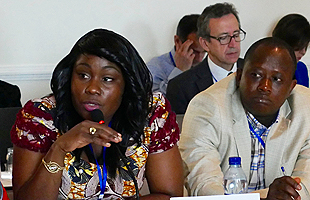You are here
Guinea, Liberia and Sierra Leone "effectively managing" Ebola flare-ups
Primary tabs
Guinea, Liberia and Sierra Leone "effectively managing" Ebola flare-ups
Health authorities from Guinea, Liberia and Sierra Leone and representatives of partner organizations have expressed confidence in the capacity of the 3 Ebola-impacted countries to effectively manage residual risks of new Ebola infections—pointing to the rapid government-led containment of recent flare-ups of the disease.

Meeting in Conakry
The review of prevention, detection and response capabilities of the three countries, as well as progress in expanding clinical care and screening for survivors came at a meeting 1 – 2 March in Conakry, Guinea, convened by WHO and attended by some 80 participants. WHO, partners and Ministry of Health staff from the three countries have been meeting regularly throughout the epidemic to assess tactics, tools, research and operations and chart strategies accordingly.
Dr Sakoba Keita, Guinea’s National Ebola Response Coordinator, opened the meeting, asserting collective progress in meeting “Phase 3” response goals: “We have enhanced our systems, are detecting and stopping small outbreaks of Ebola, identifying weak links and working together to minimize and manage risks of Ebola,” he said. “We are currently at zero cases, but we hope to be at zero risk.”
WHO believes that all original chains of transmission in the epidemic have been halted, but it continues to stress that small flare-ups are anticipated due to virus persistence in the fluids and tissues of some survivors. While the risk is declining as the virus clears from survivors, it still necessitates strong surveillance and response capacity, including the ability to detect new and suspect cases, rapid diagnosis, case isolation and management, contact tracing, community awareness and participation, safe burials and care, counselling and screening for survivors.

At the Conakry meeting, representatives of the three countries and partners provided detailed assessments of advancements, challenges and resource needs in these areas, as well as efforts to adapt and integrate Ebola-focused programmes into broader national strategies to address other diseases and health emergencies.
Evaluation of response to recent flare-ups
As an example of progress, participants evaluated the swift containment of recent flare-ups of Ebola in Liberia and Sierra Leone and the response to suspect cases in Guinea, and reviewed real-time tests of investments made in lab strengthening and diagnostics, simulations and training, rapid response teams and infection prevention and disease control at health facilities.
“These recent events show us what these countries are capable of when there is strong government leadership, experienced responders, ongoing support from partners and regional coordination, ” said Peter Graaff, director of WHO’s Ebola response, noting that Guinea deployed a ring vaccination team to Sierra Leone to vaccinate contacts while both Liberia and Sierra Leone dispatched veteran epidemiologists to each other’s country to support case investigations and testing —“drawing on the region’s expertise to curb the potential spread of Ebola to affected communities.”
All three countries pointed to community engagement and surveillance as one of the biggest gaps and challenges.
“We need to do much more to allay fear and improve communication and confidence at the community level,” said Dr Roland Conteh, head of disease surveillance programmes in Sierra Leone’s Ministry of Health. “When there is community involvement and when focal points and health workers are trained at the community level, we know it improves cooperation and surveillance. But massive training is needed.”
follow on: http://who.int/csr/disease/ebola/managing-flare-ups/en/



Recent Comments